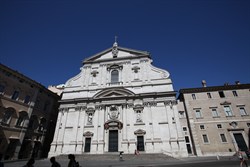Society of Jesus
 The Society of Jesus is the most important congregation of Clerics Regular founded within the Catholic Church during the sixteenth century, in response to the Protestant Reformation. Its founder, Ignatius of Loyola (1491-1556), canonized in 1622, received papal approval of his new Order in 1540. Besides the three usual vows (poverty, chastity, obedience), members of the Society, called the Jesuits, were required to pronounce a vow of direct obedience to the pope, which committed them to carry out their work wherever the pope decides to send them. The Order had a strongly hierarchical structure, headed by a General (the first General of the Order was Ignatius of Loyola), whose members were distinguished by a high level of cultural formation. Soon the Order became powerful, the most important tool of the Counter Reformation implemented by the Catholic Church in the sixteenth and seventeenth centuries. The Jesuits privileged missionary activity and education, addressing both the elite and the rural masses, adapting from time to time to the men and cultures to which they were addressing their apostolate. There were many missions in Latin America and the Far East, while a sort of new evangelization was practiced among rural populations in Europe. Teaching, however, was practiced in colleges according to the method of the Ratio Studiorum (plan of study), or on the basis of a set of scholastic and pedagogical rules prescribing the duties of the instructors in educational programs and the methods to be adopted. Gradual learning, distinctions in classes, rehearsals and regular exercises, competitions and disputes among students were its cardinal points. Besides Classical education, the Jesuits also taught a range of disciplines (fencing, music, dance, foreign languages, military architecture) that prepared students for courtly life and governance. The Jesuits, through an extensive network of colleges, came to monopolize the education of European leaders, princes and aristocrats, strengthening loyalty to Catholicism and the ideal of monarchy. Not only that. They even managed to restore the primacy of the Catholic Church in some countries that had passed to the Reformation. During the eighteenth century, the Society of Jesus was harshly criticized for its exorbitant influence in the Catholic Church, as well as in politics and society, to the point that its members were expelled from many European courts. Pope Clement XIV formally decided to disband the Order in 1773. The Company was only re-established by Pius VII in 1814. (photo: The Church del Gesù in Rome).
The Society of Jesus is the most important congregation of Clerics Regular founded within the Catholic Church during the sixteenth century, in response to the Protestant Reformation. Its founder, Ignatius of Loyola (1491-1556), canonized in 1622, received papal approval of his new Order in 1540. Besides the three usual vows (poverty, chastity, obedience), members of the Society, called the Jesuits, were required to pronounce a vow of direct obedience to the pope, which committed them to carry out their work wherever the pope decides to send them. The Order had a strongly hierarchical structure, headed by a General (the first General of the Order was Ignatius of Loyola), whose members were distinguished by a high level of cultural formation. Soon the Order became powerful, the most important tool of the Counter Reformation implemented by the Catholic Church in the sixteenth and seventeenth centuries. The Jesuits privileged missionary activity and education, addressing both the elite and the rural masses, adapting from time to time to the men and cultures to which they were addressing their apostolate. There were many missions in Latin America and the Far East, while a sort of new evangelization was practiced among rural populations in Europe. Teaching, however, was practiced in colleges according to the method of the Ratio Studiorum (plan of study), or on the basis of a set of scholastic and pedagogical rules prescribing the duties of the instructors in educational programs and the methods to be adopted. Gradual learning, distinctions in classes, rehearsals and regular exercises, competitions and disputes among students were its cardinal points. Besides Classical education, the Jesuits also taught a range of disciplines (fencing, music, dance, foreign languages, military architecture) that prepared students for courtly life and governance. The Jesuits, through an extensive network of colleges, came to monopolize the education of European leaders, princes and aristocrats, strengthening loyalty to Catholicism and the ideal of monarchy. Not only that. They even managed to restore the primacy of the Catholic Church in some countries that had passed to the Reformation. During the eighteenth century, the Society of Jesus was harshly criticized for its exorbitant influence in the Catholic Church, as well as in politics and society, to the point that its members were expelled from many European courts. Pope Clement XIV formally decided to disband the Order in 1773. The Company was only re-established by Pius VII in 1814. (photo: The Church del Gesù in Rome).
Read more:
- J.W. O’Malley, The first Jesuits, Harvard University 1993.
- R. Bireley, The Jesuits and the Thirty Years War. Kings, courts and confessors, Cambridge 2003.
- J. Martínez Millán, H. Pizarro Llorente, E. Jiménez Pablo (eds.), Los Jesuitas. Religión, política y educación (siglos XVI-XVIII), 3 voll., Madrid 2012.
